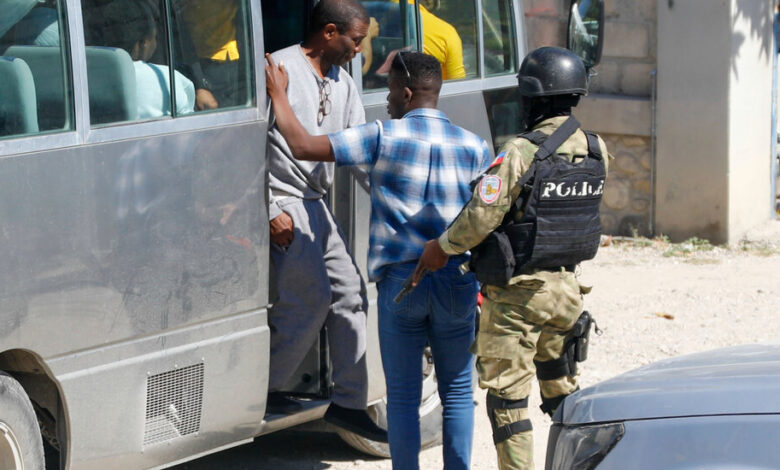
[ad_1]
Guy Philippe, the former Haitian police commander, politician and rebel who staged a coup against his country’s then-president in 2004 and served six years in a U.S. federal prison for money laundering, was deported to Haiti on Thursday, according to one of his attorneys in Haiti, Emmanuel Jeanty.
The return of Mr. Philippe, 55, has fueled concerns that he will add to the turmoil in the Caribbean country, already in a fragile state because of political instability and a rise in killings as heavily armed gangs try to quell a citizen-led vigilante movement.
It was not immediately clear what the authorities’ plans were for handling Mr. Philippe’s potentially disruptive presence in Haiti.
Upon arriving at the airport in Port-au-Prince, where local media reports said some of his supporters where seen rallying, Mr. Philippe was taken by the Haitian authorities to the headquarters of the Judicial Police Department, which is responsible for investigating crimes.
Mr. Jeanty said he and a colleague briefly saw Mr. Philippe at the station on Thursday. He said he did not know why Mr. Philippe remained there as of Thursday afternoon.
“Guy Philippe is a Haitian citizen,” Mr. Jeanty said in a phone interview. “And after his punishment, he’s back in his country. I suppose that any person, after spending time in prison, wants to return home. He’s waiting to go home and see his family.”
A police spokesman did not return requests for comment.
Mr. Philippe was one of the leaders in the 2004 coup that ousted President Jean-Bertrand Aristide. He then tried unsuccessfully to run for president in 2006, but did win election to the Haitian Senate in 2016.
Something of a populist hero, particularly in his native southwest region, Mr. Philippe was dogged by accusations of human rights abuses, including extrajudicial killings while a top police official.
In 2005, Mr. Philippe was secretly indicted by a federal grand jury in the United States that accused him of running drugs from Colombia out of Haiti, and laundering money. He evaded capture for years. In an interview with The New York Times in 2016, he maintained that the Americans could find him if they wanted to, as he was living in plain sight.
In January 2017, Mr. Philippe was arrested in Haiti and extradited to the United States. After initially arguing that he had been “kidnapped” for his “political beliefs,” he pleaded guilty months later to a money-laundering conspiracy and was sentenced to nine years in prison.
According to federal records, Mr. Philippe was released from prison in Georgia on Sept. 7. He was then transferred into immigration custody and was deported to Haiti on Thursday.
The White House referred requests for comment to Immigration and Customs Enforcement and the State Department. ICE declined to comment. And the departments of Homeland Security and State did not respond to requests for comment.
Mr. Philippe’s arrest in 2017 incited violent protests among his followers, and experts said he could try to build his support back up and become a political force.
“It’s hard to speculate what, if anything, this will mean,” said Jake Johnston, a Haiti expert at the Center for Economic and Policy Research in Washington, speaking of Mr. Philippe’s return. “Obviously given his history and his past connections and political ambitions, you can expect it to have some influence on the political situation of the country. But to what extent he has a broad following or direct ambitions right now, we don’t know. We don’t even know if he’s going to be in jail tomorrow or not.”
In a letter to the court last November arguing for a reduced sentence, Mr. Philippe wrote that he had “learned from his recklessness and gained an appreciation for risks and consequences” and was looking forward to returning to Haiti to “participate in the betterment” of his community of Pestel on the Tiburon peninsula.
The 2021 assassination of President Jovenel Moïse of Haiti created a power vacuum in the already volatile nation, and gangs took advantage. A vigilante movement, largely comprising ordinary Haitians in Port-au-Prince and often carrying machetes instead of guns, coalesced earlier this year. Gangs have fought back, causing a resurgence of violence.
Haiti’s prime minister, Ariel Henry, appealed last year for foreign troops to help restore order. Last month, the United Nations Security Council authorized a Kenyan plan to address the gang violence, in what will be the first time an African country has led such a mission in Haiti. According to the United Nations, more than 3,000 homicides have been reported this year in Haiti, along with 1,500 instances of kidnappings for ransom, and 200,000 people have been forced to flee their homes because of the unrest.
But both ordinary Haitians and experts on the country have doubted if the effort — which called for the deployment of 1,000 Kenyan police officers and several hundred officers or soldiers from Caribbean countries, a smaller force than past interventions in Haiti — would be enough. The Biden administration, which supported the Kenyan plan, was reluctant to lead the mission.
Andre Paultre contributed reporting from Port-au-Prince, Haiti, and Zolan Kanno-Youngs from Mexico City.
Source link




